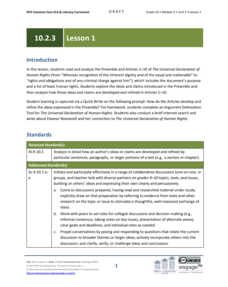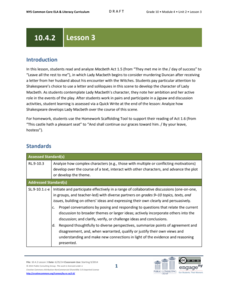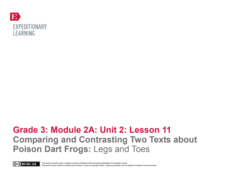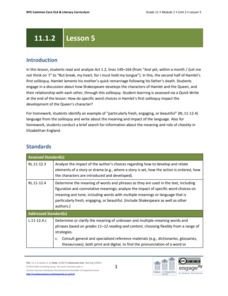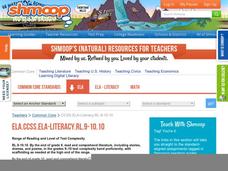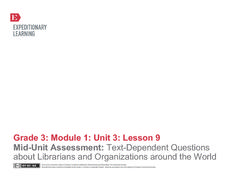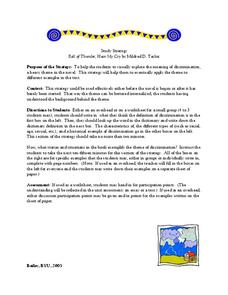EngageNY
Grade 9 ELA Module 4, Unit 1, Lesson 5
What did the Crusades and plantations do with the global sugar spread? As class members continue their study of Sugar Changed the World, they examine how Crusaders brought sugar to Western Europe and how cultivating sugar led to the...
EngageNY
Grade 10 ELA Module 2: Unit 3, Lesson 1
Scholars examine the Universal Declaration of Human Rights and analyze the ideas in the preamble. Readers define new vocabulary words, listen to a Masterful Reading, answer questions in pairs, participate in a jigsaw discussion, and...
EngageNY
Grade 10 ELA Module 4: Unit 2, Lesson 7
One sentence, so much meaning. Scholars analyze a quote from Act 2.3 of Shakespeare's Macbeth and explore the plot in a jigsaw discussion.
EngageNY
Grade 10 ELA Module 4: Unit 2, Lesson 3
How does Lady Macbeth's ambition help advance the plot of Shakespeare's Macbeth? Scholars explore the topic using discussion and a jigsaw activity. Next, they complete a quick write to analyze how Shakespeare develops Lady Macbeth's...
EngageNY
Grade 10 ELA Module 4: Unit 2, Lesson 2
What is the best way to determine the theme of a text? Pupils analyze how central ideas emerge in Shakespeare's tragedy Macbeth. They work in small groups and engage in a whole-class discussion to discuss the play's plot. Finally,...
EngageNY
Comparing and Contrasting Two Texts about Poison Dart Frogs: Legs and Toes
A lesson plan challenges scholars to compare and contrast two readings about Poison Dart Frogs. Information presented comes from different informational texts, followed by a discussion, and the completion of a Venn diagram. A one-page...
EngageNY
Grade 11 ELA Module 1: Unit 3, Lesson 5
There's a fine line between madness and genius. Using the resource, scholars complete a mid-unit assessment based on their study of Virginia Woolf's A Room of One's Own. They write a multi-paragraph response, analyzing how two central...
EngageNY
Grade 11 ELA Module 2: Unit 1, Lesson 5
I have an idea! Scholars examine closely how Du Bois develops a central idea in paragraph four of the chapter "Of Our Spiritual Strivings." They also begin finding significant and relevant evidence to support a topic and complete...
EngageNY
Building Background Knowledge: Small-Group Work to Learn More about the History of Wars in Vietnam
Scholars take a close look at "The Vietnam Wars." They answer questions and discuss in groups to conclude that the author respects the Vietnamese. They participate in a modified jigsaw discussion and end the exercise with a quick writing...
EngageNY
Analyzing Text Structure & Summarizing Text: “Equal Rights for Women” by Shirley Chisholm
Let me check my schedule! Scholars set up discussion appointments with five classmates to discuss Shirley Chisholm's speech "Equal Rights for Women." Readers then use their Note Catcher guides to analyze the text of the speech more...
EngageNY
Analyzing the Author’s Perspective: “The Shakespeare Shakedown”
Simon Schama's article "The Shakespeare Shakedown" allows young writers to see how authors respond to conflicting viewpoints. Class members participate in discussion appointments with five peers to explore the author's point of view.
EngageNY
Analyzing Events: Carlotta’s Journey
How does one talk silently? Class members participate in a silent communication activity known as a Chalk Talk. During the activity, they answer text-dependent questions analyzing Carlotta’s Journey. They use markers and chart paper to...
EngageNY
Grade 11 ELA Module 1: Unit 2, Lesson 10
To write an essay or not to write an essay—that is the question! Scholars complete a mid-unit assessment based on their study of Hamlet. They write essays analyzing how Shakespeare develops Hamlet's character about other characters.
EngageNY
Grade 11 ELA Module 1: Unit 2, Lesson 5
Scholars delve into Act 1.2 of Shakespeare's Hamlet. By completing a writing exercise and participating in a class discussion, they continue to analyze how the author develops the characters in the play.
Curated OER
What Makes Jokes Funny?
Explore how language is used for comic effect. Middle schoolers determine which of the three formulas for jokes (double meanings, unexpected outcome, humorous mental image) make each of 18 classic, corny examples funny. They complete a...
Curated OER
Trek Across America
Bring a time machine into your classroom with this writing lesson plan, in which young writers project themselves back in time and have a variety of choices from that point forward. They either write a conversation with a historical...
New Class Museum
Lesson: Emory Douglas: Decoding Images and Vocabulary Activity
To better understand the work of Black Panther logo artist Emory Douglas, learners define literary devices. They define a series of words such as metaphor, simile, and assonance, then place an example of that device found in Emory...
Curated OER
Justice for All
A reading of Roald Dahl’s Lamb to the Slaughter opens a discussion of justice and fairness. Using a Venn diagram and an Idea Wheel graphic organizer, class members consider the similarities and differences in these two terms. They then...
Curated OER
Private & Public
Some disabled students have a difficulty understanding what is and what is not publicly appropriate behavior. Help them build healthy social skills by defining public and private behaviors, labeling public and private places, and...
Shmoop
ELA.CCSS.ELA-Literacy.RL.9-10.10
How do you assess what your pupils have learned over the course of the year? Find out how competent they are at reading and analyzing age-level literature with the ideas presented here. Included in this resource are two suggested...
EngageNY
Mid-Unit Assessment: Answering Text-Dependent Questions About Librarians and Organizations Around the World
This is a skills-based assessment that asks test takers to use textual evidence to determine the main idea of an excerpt from an informational text as well as respond to text-dependent questions. The assessment is the middle point...
Novelinks
Roll of Thunder, Hear My Cry: Study Strategy
Readers of Roll of Thunder, Hear My Cry expand their understanding of discrimination by using the provided graphic organizer to record the definition of the word, characteristics of and different types of discrimination, as well as...
Ohio Department of Education
Observe Then Infer
To develop their skill at drawing inferences from observations, sixth graders rotate through six stations, conduct a series of experiments, make observations, and draw inference from what they observe.
EngageNY
Grade 10 ELA Module 1: Unit 1, Lesson 3
Poets write love letters, but how often do the objects of their love write back? Compare Christopher Marlowe's "A Passionate Shepard to His Love" to Sir Walter Raleigh's response, "The Nymph's Reply to the Shepherd," with an engaging...
Other popular searches
- English Language Skills
- Pragmatic Language Skills
- Expressive Language Skills
- Oral Language Skills
- Language Skills Lesson Plans
- English Language Arts Skills
- Early Literacy Oral Language
- Functional Language Skills
- Social Language Skills
- Studying Latin Language
- Basic Language Skills
- Figurative Language Skills



